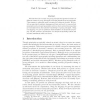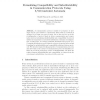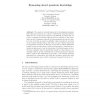286 search results - page 8 / 58 » Pitfalls in Formal Reasoning about Security Protocols |
FM
1999
Springer
15 years 5 months ago
1999
Springer
We introduce the concept of a group principal and present a number of different classes of group principals, including threshold-group-principals. These appear to naturally usefu...
102
click to vote
FSEN
2007
Springer
15 years 7 months ago
2007
Springer
Abstract. A communication protocol consists of a sequence of messages used by peer entities to communicate. Each entity in a network is equipped by at least one protocol stack. Due...
112
click to vote
CIA
2004
Springer
15 years 6 months ago
2004
Springer
Given a specification of communication rules in a multiagent system (in the form of protocols, ACL semantics, etc.), the question of how to design appropriate agents that can oper...
104
click to vote
FSTTCS
2005
Springer
15 years 7 months ago
2005
Springer
We construct a formal framework for investigating epistemic and temporal notions in the context of distributed quantum systems. While we rely on structures developed in [DDKP05], w...
108
click to vote
ESOP
2010
Springer
15 years 10 months ago
2010
Springer
Transient faults are single-shot hardware errors caused by high energy particles from space, manufacturing defects, overheating, and other sources. Such faults can be devastating f...



